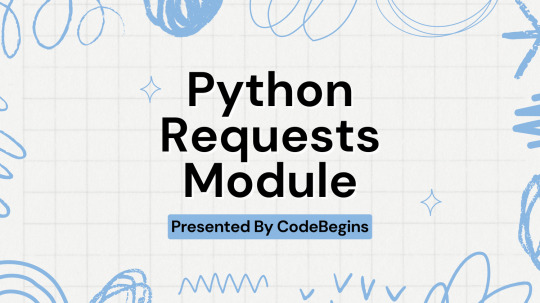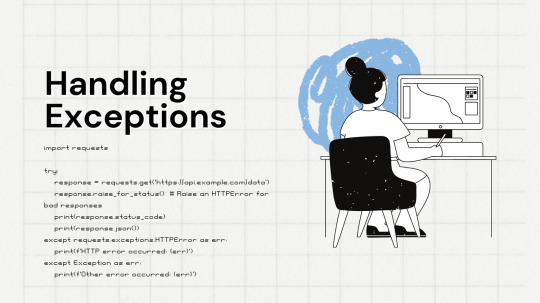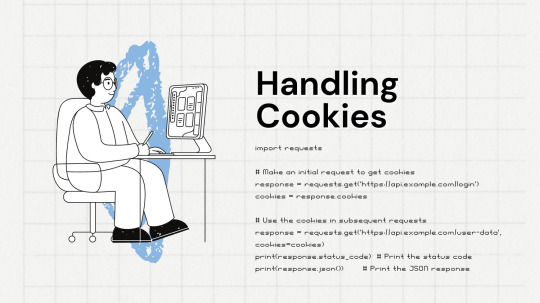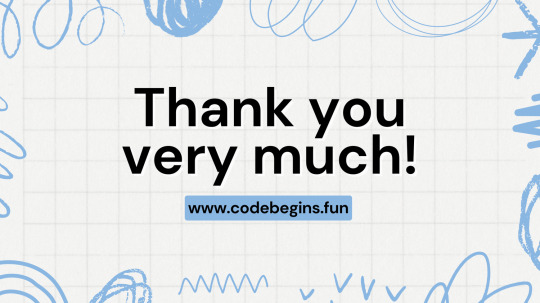#learningguides
Explore tagged Tumblr posts
Photo






Elevate your Python skills by mastering the art of making HTTP requests with our latest guide! Follow us for more... #Python #PythonDevelopment #Programmers #LearningGuide #PythonProgrammers
0 notes
Text
LHTL 2017 - Notes/Transcript
Learning How to Learn Seminar Series - 2017
Obtaining Higher Learning
Thinking About Your Thinking
4 notes
·
View notes
Link
0 notes
Photo

because of the lack of proper motivation and the ability to focus on their passion, an amateur guitarist might be derails himselves’ from the path during his guitar learning course and it requires some tips for guitarist to stay focused and motivated. Check details and link in bio. . . . . #guitars #guitarist #guitarplayer #guitarhero #instrument #guitarsdaily #guitarspotter #knowyourguitar #musicismylife #iloveguitars #acousticguitar #guitartips #guitarguide #guitarsarebetter #guitarsofinstagram #bestfriend #musicflow #playmusic #musiclover #guitarlife #guitarlearner #learningguitar #learningguides #guidance #motivation #motivate2change #focus #guitarlesson (at United States) https://www.instagram.com/p/B5VohR0HlEE/?igshid=fjwuncdavl4d
#guitars#guitarist#guitarplayer#guitarhero#instrument#guitarsdaily#guitarspotter#knowyourguitar#musicismylife#iloveguitars#acousticguitar#guitartips#guitarguide#guitarsarebetter#guitarsofinstagram#bestfriend#musicflow#playmusic#musiclover#guitarlife#guitarlearner#learningguitar#learningguides#guidance#motivation#motivate2change#focus#guitarlesson
1 note
·
View note
Photo

A Gentle Introduction to Hint Learning & Knowledge Distillation Author(s): LA Tran Deep LearningGuide a student to learn a teacher’s behavior.Knowledge distillation is a method to distill the knowledge in an ensemble of cumbersome models and compress it into a single model in order to make possible deployments to real-life applications. Knowledge distillation was introduced by the Godfather of AI, Geoffrey Hinton, and his two co-workers at Google, Oriol Vinyals and Jeff Dean in 2015.Image from Prakhar’s post [source]Knowledge distillation refers to the transfer of the learning behavior of a cumbersome model (teacher) to a smaller one (student), in which, the output produced by the teacher is used as the “soft targets” for training the student. By applying this method, the #MachineLearning #ML #ArtificialIntelligence #AI #DataScience #DeepLearning #Technology #Programming #News #Research #MLOps #EnterpriseAI #TowardsAI #Coding #Programming #Dev #SoftwareEngineering https://bit.ly/3ELTt4n #latest
0 notes
Link
歴史の論文を書くということ(暫定版) from MunenoriNAGAO
0 notes
Text
Week 1
Week 1! You can tell from the returning students who have kids - we are the ones who can't wait to be back. :D
Week 1 lectures usually consist of general information, and give a general idea on what each unit requires in terms of workload, attendance, and assignments. At WSU you will also hear the lecturers talk a fair bit about PASS (Peer Assisted Study Sessions), which are excellent free study groups lead by fellow students. More on PASS in a later post, but for now I recommend noting when the sessions are held for your units as they are proven to provide better grades for attending students.
By now you should have the following sorted:
Timetable including a copy handy (mine is set as a laptop wallpaper)
Learning guides for each unit checked and read
Weekly plan for week 1 including tasks due
Semester plan filled out with deadlines
Working towards a great result in final exams starts this week. No joke. Have you checked the learning guide (yeah that thing I keep banging on about) for unit assessment items? If the exam is 40% or 50% of the final grade, you have a chance of passing the unit before exams kick off by really focusing on assignments; walking to an exam with a pass already secured is a great feeling and takes a lot of stress out of the situation. Do your preparation well, you have 14 weeks to ace this.
Remember to prep for week 2 at the end of this week. Think back on week 1, what needs to change, what worked well, which deadlines are coming. Factor all these in, and allocate a time for each task in your weekly schedule.
What am I doing this week?
Attending all lectures with learning guides studied and checked for questions
Completing all the required WHS quizzes and other tasks scheduled for week 1
Testing how the weekly schedule works and what needs fine tuning
Creating a schedule for week 2 on the weekend
Enjoying being back!
0 notes
Text
This is the ultimate guide on Digital Marketing Channels, which will help you easily navigate the topic and more! Via @LearningGuides #DigitalMarketing #elearning https://t.co/8r7c5HEK9e https://t.co/ghCgUKhKb6
This is the ultimate guide on Digital Marketing Channels, which will help you easily navigate the topic and more! Via @LearningGuides#DigitalMarketing#elearninghttps://t.co/8r7c5HEK9e pic.twitter.com/ghCgUKhKb6
— Soumen Halder (@hsoumen) December 26, 2019
via Twitter https://twitter.com/hsoumen December 26, 2019 at 01:45PM
0 notes
Text
Top 20 #socialmediamarketing courses that will boost your resume. Improve your digital marketing skills now via @LearningGuides https://t.co/vCN07U66gd #smm
Top 20 #socialmediamarketing courses that will boost your resume. Improve your digital marketing skills now via @LearningGuideshttps://t.co/vCN07U66gd #smm
— Digital Shift® (@digitalshiftpro) December 19, 2019
via Twitter https://twitter.com/digitalshiftpro December 18, 2019 at 06:07PM
0 notes
Text
Tweeted
Top 20 #socialmediamarketing courses that will boost your resume. Improve your digital marketing skills now via @LearningGuideshttps://t.co/54BaDTwtT2 #smm pic.twitter.com/OAaKfAe5RJ
— Noovelty (@noovelty) October 10, 2019
0 notes
Link
Obtaining Higher Learning: Thu Jan 5 (mp4 video)
https://cityinmars.tumblr.com/post/183123839891/learning-resources
https://cityinmars.tumblr.com/post/183123839891/obtaining-higher-learning-2017
Enhance your performance and become a better learner by attending the Learning how to Learn Seminar Series. Learn how to engage with course material at a university level and improve your thinking and learning skills.
Thinking About Your Thinking: Thu Jan 19 (mp4 video)
The ability to think about one's own thinking, called metacognition, is considered to be one of the most important skill sets. In this seminar you will be introduced to metacognition and learn how to apply it to your studies and beyond.
Embracing Failure: Thu Feb 2 (mp4 video)
A fear of failure can be extremely paralyzing. It can lead to stress, anxiety, and procrastination. In this seminar, we will discuss how to view failure, and, in particular, how to develop a growth mindset.
Learning in Lectures: Thu Feb 16 (mp4 video)
Do you find that lectures are mostly a scramble between trying to listen to the professor and take notes? In this session, I will show you how to improve your efficiency and comprehension during lectures.
The Neuroscience of Memory: Thu Mar 2 (mp4 video)
Using fMRI scans, neuroscientists have discovered a great deal about the brain. In this seminar, we will see how to use these discoveries to make learning more efficient and long lasting.
Effective Study: Thu Mar 16 (mp4 video)
There is much to accomplish in your school life and your time is a precious and limited resource. In this seminar you will learn to recognize the signs of ineffective study habits and how to redirect your efforts to study smarter, not longer.
Recommended viewing:
Learning how to learn by Barbara Oakley, Oakland University. TED talk, 2014, 17 minutes.
Learning how to learn by Barbara Oakley, Oakland University. Learning Technologies Symposium 2016 keynote lecture, Learning technology Symposium, McMaster University, 2016, 65 minutes.
Grit: the power of passion and perseverance by Angela Lee Duckworth, University of Pennsylvania. TED talk, 2013, 6 minutes.
The clip in the fifth seminar about "The Neuroscience of Memory" is from How we learn with Robert Winston by Robert Winston.
3 notes
·
View notes
Text
0 notes
Link
MATH SHORTCUTS/TRICKS
9 /.25 is the same as 9 * 4 = 36.
6/.25 = 6*4 = 24
MENTAL PICTURES - PT. 2
12 names streets in the long beach area
Groups A, B, C, D.
A - Hay.
The first street in group A is market.
Supermarket with just hay on the shelves. Everyone in the market is reading magazines.
DEFINITIONS
EXACT LOCATIONS
#memory tricks#math tricks#study skills#learning resources#memorytricks#studytips#studyguides#learningguides
2 notes
·
View notes
Link
[video]
Learning How to Learn Seminar Series - 2017
Thinking About Your Thinking
The goal of this seminar is to show students how to learn deeply and efficiently.
“The most important thing you can learn in university is learning how to learn.”
No matter what you do in the future, whether you decide to pursue graduate studies or enter the work force, there is a 99.9% chance that it will require on the spot learning.
“The most valuable thing you can ever do is know how you personally best learn”.
It is not enough to learn, you need to figure out how to learn deeply.
Topics:
Studying vs Learning
Levels of Learning
High school vs Post-secondary mathematics.
How to study for problems that require the top levels of learning?
Your educational goals
Conclusion
Studying vs Learning
Q: What is the difference between studying and learning?
Q: Do you believe there is no difference between studying and learning?
----------------------------------------------------------------------------------------
According to Merriam-Webster: Learning is knowledge or skill acquired by instruction or study. Studying is the activity or process of learning about something by reading, memorizing facts, etc.
Q: What is something that you’ve learned but never studied?
Studying is one of the avenues for learning. “Studying can help us learn, but in many cases it is not even required to do learning. Theoretically, we should be studying to help us learn - that means studying in the right way and studying the right things.
Q: Are you guaranteed to do well on a test if you have studied lots?
Q: Are you guaranteed to do well on a test if you have learned lots?
Both do not guarantee you are going to perform well on a test.
“The most common problem: students think they have really learned the material well, but it is not until they receive their results that they discover that they have not learned the material to the level of expectations of their professor”.
Levels of Learning
Blooms Taxonomy (Revised) [1] [2] [3]

https://wp0.vanderbilt.edu/cft/guides-sub-pages/blooms-taxonomy/
The levels of learning as they pertain to mathematics:
The levels of learning from the most basic is remembering, understanding, applying, analyzing, evaluating, and to the highest level of understanding, creating.
Remembering: The most basic form of learning is remembering. “Just have it memorized!”
A question on a test at the remembering level would be: State the fundamental theorem of calculus.
Understanding: Being able to use a definition or a theorem in some very simple way. To perform calculations for example.
A question on a test at this level would be: Take the derivative of this function using the product rule. Find the eigenvalues of this matrix.
Applying: Applying some known algorithm or using definitions or theorems in a new but very simple way.
Questions at the applying level would be like curve sketching questions in calculus. Where you have a whole set of steps you need to do to solve the question.
Analyzing: ‘I like the analyzing level. The analyzing level is a type of question where after the midterm, the student comes up to me and says, “You didn’t teach me how to do that!!!”, and I say, “You’re right!!! Welcome to University!!!”
Analyzing Level: Looking at a new problem and using the content you’ve learned to solve this new problem. While the question might look unfamiliar, it’s solution requires the techniques you have learned over the semester.
The analyzing level could also include types of questions where you have to decide on a particular method. For instance, integration problems where you have to pick one of many different techniques of integration. It requires you to look carefully at the problem and then decide what you need to do from there.
Evaluating: “Often true or false problems, where the answer isn’t simple. Where you really have to think carefully about definitions or theorems to evaluate whether it is true or false. Questions at this level might require you to evaluate a large amount of data and make a prediction”.
Creating: PROOFS!!!!!!!!!!!!!!!
Note: A question is not at the “create level” just because it has the word prove or proof in it. It is possible to have lower level proof questions. For example, if your professor tells you to memorize a proof. A question involving this proof on your test would be at the remembering level.
“Creating questions are when you really have to synthesize lots of different definitions and theorems to create a new proof or a new method for solving a type of problem.
High school vs Post-secondary mathematics.
Q: What levels of learning were required in your high school (hs)courses to get really good grades?
“The vast majority of questions in hs math tests are solely from the bottom three levels.”
In university, all the levels of learning are required for students to succeed.
Most students start blaming themselves or their study habits when they struggle in their transition from highschool to university/college mathematics, as oppose to realizing that it’s not them or the course. The problem is that that they are still preparing for tests and exams the same way that they did in high school.
How to study for exams that require the top levels of learning?
You need to understand the questions at the lower levels to understand questions at the higher levels.
“Before you can solve higher level questions, you must be able to solve lower level questions. You are going to have a great difficult time applying something if you don’t even know what it is. So, first and foremost, all of those high school study techniques are still valuable and good, you still need them to do well. We now just need to add on top of them”.
Study Techniques for the lower level.
“How do you study to memorize things?”
Repeated repetition.
Cue cards
Asking friends to test you, or testing yourself.
Teaching someone
Using some sort of mnemonic (exs: Bedmas, SOH CAH TOA, ASTC (all students take calculus)) or other device to remember something.
Study techniques for questions in the understanding/applying levels.
Practice questions
Look at old examples
****Note: ‘If you are working on a practice problem, and get stuck, and then just look at the solution, and go, “I know how to do that :) “. NO YOU DON’T :( If you knew it, you wouldn’t have had to look at the solution! Be careful that you are not just trying to memorize the problems, but that you can solve them on your own.’
*****Also avoid just watching someone do the calculations.
Top Level Study Strategies
We need different techniques to solve higher level problems. For example, you cannot employ the repeated practice technique to study for questions at the creating level. “How do you repeated practice a problem you’ve never seen before?”
The strategies:
Look at someone else’s solution and try to critique it (evaluating level). Trying to decide if someone else’s argument is correct.
Look at tricky problems and try to generate your own problems (creating level). Ask yourself more in-depth type questions and literally try to create your own tricky test problems. “When you start asking yourself good questions. What would happen if I changed this? What would happen if this number was a 5? Not only are you going to be thinking more deeply about the material, but you might actually start anticipating test questions”.
Course Maps: Looking at the topics in a course and seeing how they are related. “Once you start doing this, you will start making connections to other courses and that will help your understanding of the topics”.
Discussing with your peers. Work in a group!
“Peer discussions are often better than discussing with your professor.”
“You have to justify your own solutions, and explain it a lot more carefully.”
“Your fellow classmates will have questions that you might or might not be able to answer, and vice versa ( if you’re the one with the answers, this will ensure that you understand a question. Or if you don’t understand, it means you have more learning to do).”
‘You will have to think more critically about what your peers says over your professor. Students typically think their professors are speaking the truth. If you are learning from a peer, you might question a little bit more. There might be a lot more of, “ uh that doesn’t sound right to me”. It forces you to understand at the evaluating level, because it is quite difficult to critically evaluate whether someone else’s argument is correct or false.’
“If you have problems writing your proofs, start analyzing other people’s proofs. You will find that this makes it easier to write your own proofs, because not only will you have seen what other people do well or not so well, but it’s going to give you that thought process of critically evaluating every step you do”.
“Therefore, study groups are the best way of studying problems at the higher level.”
Every student in the group can bring one or two questions so that the group can make a mock test for each student to solve individually. Once this is done, the individual test should be passed around for marking.
Note about bad study habits: Avoid solving problems in the text book in chronological order. For example, starting with section 1, then section 2 problems and so on.
Reasons to stop solving problems chronologically:
1. The material is still fresh in your mind.
2. When you are in a certain section, you know what methods you should be using to solve the problems. If you are in the integration by parts chapter, you know what you should be doing. On a test, the problems will not be in order, nor will the section from which the problem was taken from be specified. One of trickiest parts of a test is analyzing or evaluating what method you should be using to solve questions. If you are already in a particular section, you already figured that out, or it’s been told to you. So the question is now at the applying level.
Summary:
Use group work for top level problems. Do not be afraid to ask your peers questions, or teach them something they don’t know. This will make those hard test questions easier.
Still revise and practice questions at the lower levels
Your Goals
For the hardest math or cs course that you are taking this term, what grade would you like to achieve in that course?
“Aim for the stars, and if you only reach the moon, hey, you’ve reached the moon.”
There is no excuse why you shouldn’t be aiming for the highest grade. While you might not actually receive the best grade; it should be your goal. Don’t shortchange yourself. You are capable. If you limit yourself, you’ve put a cap on yourself. Do as much as you can. Learn as much as you can. Work very hard.
This requires very good and effective time management, lots of hard work, and good learning skills. As well as support from your peers, professors and TAs.
Work towards the higher levels. Figure out what level you are at (if you are working on a problem set and find that you have to look at the solutions, or get help from a professor, TA, or a friend, then you are probably not at the higher levels yet), and what you have to do to advance.
‘Every time you are studying, look at the type of question you are doing and ask, “Where does that question fall on the chart? And can I do that on my own without help. If so, yay! Now how can I get to the next level.” ’
Conclusion
You must achieve the lower levels of learning before you can obtain the higher levels.
Always try to critically evaluate where your level of learning is. The technical term for this is called meta cognition.
#studyblr#productivity#howtolearn#danwolczuk#studying#100 days of productivity#learningguides#studytips#studyresources
2 notes
·
View notes
Link
Grades versus Learning: Thu Feb 1 (mp4 video)
With so many aspects of academia being based on grades, such as admittance and scholarships, it is easy to see why many students are grade focused. However, research indicates that some students become so grade focused that it actually negatively affects their grades. In this seminar, we will discuss the advantages of focusing on learning rather than on grades and strategies for doing so.
Advanced Learning Strategies: Thu Feb 15 (mp4 video)
In recent years, the University of Waterloo has put considerable effort into improving teaching. Methods designed to improve student learning such as 'flipped classrooms', 'cooperative learning', and 'active learning' are being employed by more and more instructors across campus. In this seminar, we will discuss what principles these methods are based on, how you can maximize their effectiveness, and, most importantly, how you can use these strategies even when your instructor is not employing them.
Illusions of Competence: Thu Mar 8 (mp4 video)
Many, if not most, students have had the experience of feeling prepared before writing a test only to discover, either when writing the test or when receiving the mark for the test, that they were not as prepared as they believed. Such illusions of competence are often caused by using study habits that do not match the conditions of the test, for example referencing notes or looking at solutions during practice. In this seminar, we will discuss learning strategies designed to help you avoid having an illusion of competence.
Getting Help: Thu Mar 22 (mp4 video)
The key to success in any field is getting help. Olympic athletes would not have achieved as much without the help of their trainers, physiotherapists, sports psychologists, and fellow athletes. Of course, it is also quite easy to get too much help, for example having someone just give you the solution to a problem. In this seminar, we will discuss how to find the balance between getting not enough and getting too much help, and how to maximize the benefit of TAs, tutors, and cooperative learning.
Recommended viewing:
Learning how to learn by Barbara Oakley, Oakland University. TED talk, 2014, 17 minutes.
Learning how to learn by Barbara Oakley, Oakland University. Learning Technologies Symposium 2016 keynote lecture, Learning technology Symposium, McMaster University, 2016, 65 minutes.
Grit: the power of passion and perseverance by Angela Lee Duckworth, University of Pennsylvania. TED talk, 2013, 6 minutes.
How we learn with Robert Winston by Robert Winston.
Learning How to Learn Seminar Series (2017) by Dan Wolczuk, Mathematics Faculty, University of Waterloo.
#learning#learningresources#university#highschooltips#mathematics#studyblr#danwolczuk#learningguides#studyresources
1 note
·
View note